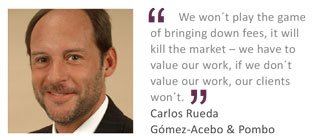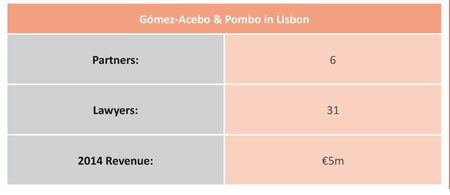A new dawn? – Gómez-Acebo & Pombo
Gómez-Acebo & Pombo´s Lisbon office has experienced some significant personnel changes in the last year but with a new managing partner, new offices and its best annual results to date, it looks to be on the up
It has been all-change in Gómez-Acebo & Pombo´s Lisbon practice in 2015. Not only did the firm move into new offices in the city´s Avenida Duque de Ávila in January of this year but, at the same time, it also appointed a new resident partner, Carlos Rueda. He replaced Fermín Garbayo, who returned to the firm´s Madrid office following a five-year stint in charge of the Lisbon office. Unlike Garbayo, who was full-time in Lisbon, Rueda only spends two or three days per week in the Portuguese capital. However, Rueda rejects any suggestion that his working arrangements represent a scaling down of the firm´s Lisbon practice. “I´m still a partner in the banking and finance team in Madrid and I´m also in charge of recruitment for the firm as a whole,” Rueda says. “We did not think it was necessary to have a full time resident partner in Lisbon.”
Why did the firm decide to install a new leader in the Lisbon office? “It was a natural time for a change,” says Rueda. “We don´t have partners in our international offices for a long time – for example, we changed our partner in London at the same time as we made the change in Lisbon.” Rueda says Garbayo, who had led the Portuguese office since it opened in 2010, did a “good job”. For how long will Rueda be in charge? He says that he will not be in the firm´s Lisbon office for a fixed period, though he envisages heading the Portuguese practice for “around three years”.
 Nothing to hide
Nothing to hide
The feeling is that GA&P´s Portuguese practice hit new heights in the last year. Rueda says that 2014 was the Lisbon office´s “best year yet”. He adds: “The office is still growing and turnover was up 30 per cent in the last year”. GA&P´s Portuguese practice generated revenue totalling €5m in 2014 – Rueda believes it is important for a law firm to be transparent about its financial performance: “We have nothing to hide, it´s important to discuss these things internally, otherwise you can get people gossiping.” He adds that the firm is focusing on these main areas of potential growth: public law (which generates more than 50 per cent of the office´s work and includes a construction arbitration practice) and corporate and M&A and banking & finance. He says corporate and M&A and banking & finance work is growing at the fastest rate, largely because of international investors´ interest in real estate assets. Rueda says the Lisbon office has “very good partners” in these areas, and highlights the talents of administrative, regulatory and arbitration experts Albano Sarmento, Paulo Nogueira da Rocha and Ricardo Ramos Campos, as well as banking & finance partner Mafalda Barreto.
The firm currently has six partners (Rueda is the only Spanish partner, the rest are Portuguese) and a total of 31 lawyers. Rueda adds that the firm grew “slightly” in terms of headcount in the last year – this was partly due to the lateral hire of Mário Marques Mendes, the founder of the law firm Marques Mendes & Associados, and one of the most respected EU and competition lawyers in Portugal. “He had a boutique firm in Lisbon, number one in competition,” says Rueda. “We were lucky he had made the decision to join a big firm – it reinforces our position here, advice on competition law is in high demand from clients.” Rueda adds: “We always look for the best possible synergies – Portuguese clients have interests in Spain and local [Portuguese] lawyers can benefit from the structure of a bigger firm, such as IT support, financing arrangements and experience of other transactions.”
Will the firm be making any more lateral hires? “We would normally be looking at natural growth – we devote a lot of time to recruitment and education of our junior lawyers,” Rueda says. “However, we are always open to good opportunities, so lateral hires are a possibility if we find the right people.”
Perception versus reality
Rueda argues that the perception of GA&P´s Portuguese practice does not necessarily match the reality. “With the legal directories, for example, there is a time gap,” he says. “It takes time to position ourselves in directories – in a year´s time, I think our profile will look different, in banking and finance and corporate, we will go up in the rankings this year.” Rueda says that, while corporate and M&A will be the key driver of growth in the Lisbon office, the firm will “not leave aside the rest of its practices”. When it is put to Rueda that there is a view in the Portuguese legal market that GA&P has rather a niche offering in Lisbon, he emphasises that the firm does offer a “full service” in Portugal.
Why haven´t more Spanish firms opened in Portugal? “Maybe other firms are not finding the right partners – you have to find good partners, the market is mature, unless you have a team with the appropriate partner it is quite difficult,” Rueda says. “Perhaps it´s not been the best time in recent years – Spanish firms are focussing on their existing practices, but maybe other Spanish firms will open here.” That said, Rueda says he does not expect a lot of movement among the big firms in the Portuguese legal market.
GA&P is known to have had an alliance with Vieira de Almeida prior to launching its own operation in Lisbon. According to Rueda, GA&P took the step of opening a Portuguese office because it “believed in the concept of an Iberian law firm”. He adds: “Our clients had business in Portugal and demanded a type of service based on our own philosophy that we would only be able to offer by opening our own office.”
Was opening an office in Portugal more challenging than GA&P first thought? Rueda admits that the firm has work to do on enhancing its profile in the market. “We´re not as well positioned as we should be in the [legal directory] rankings,” he says. Meanwhile, Rueda acknowledges that there has been some “partner rotation” in the firm´s Lisbon office, in particular in the corporate area, though he adds that this has “enabled us to bring on board the right people for the project that we want”. One of the key figures that left the firm was Jorge Santiago Neves – one of the joint heads of the office when it first opened in 2010 – who departed in 2014.
Don´t kill the market
While Angola and Mozambique are two markets that present significant opportunities for many Portuguese law firms, Rueda says GA&P has no plans to open an office in either jurisdiction. “We do have business there, but we use counsel on a case by case basis.” Rueda is optimistic about the prospects for the Lisbon office in the coming year. “I think and hope there will be more growth – we are becoming more known in the Portuguese market – we´ve had a good flow of work from international clients in the last year, but the majority of our clients are based in Portugal.” Rueda adds that one of the focuses of the Portuguese office will be to “become more local while not losing our international focus”. He adds: “This means working on business development in Portugal – cross-selling works and we train our lawyers in cross-selling.”
One of the biggest challenges facing the firm in the future will be keeping lawyers happy and motivated, according to Rueda. “Particularly in a firm with a big structure, lawyers may feel their problems are not heard,” he says. Meanwhile, Rueda firmly believes that lawyers need to be fully aware of their worth to clients. “Value added services are our essence and have to be remunerated accordingly,” he argues. “We won´t play the game of bringing down fees, it will kill the market – we have to value our work, if we don´t value our work, our clients won´t.”












